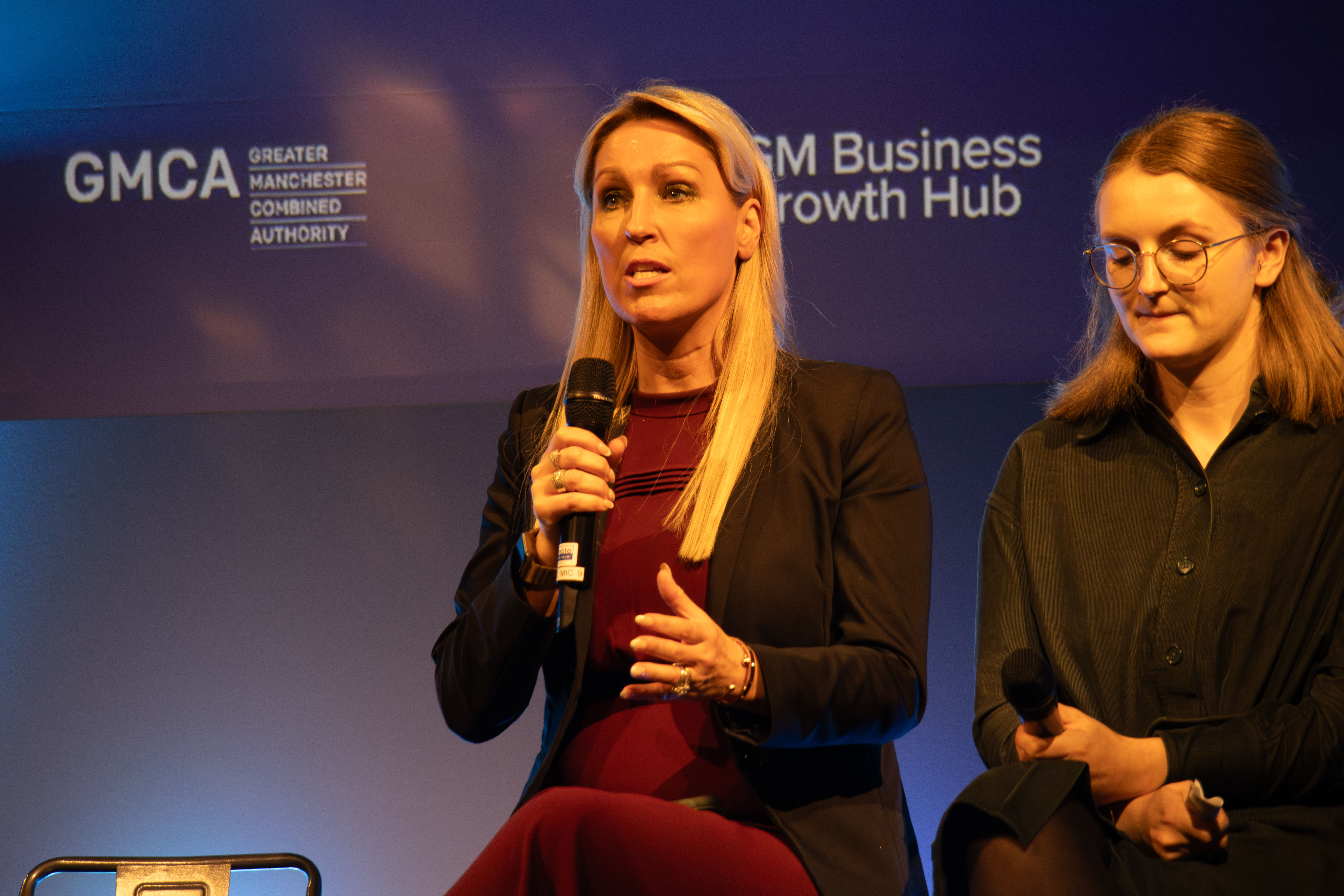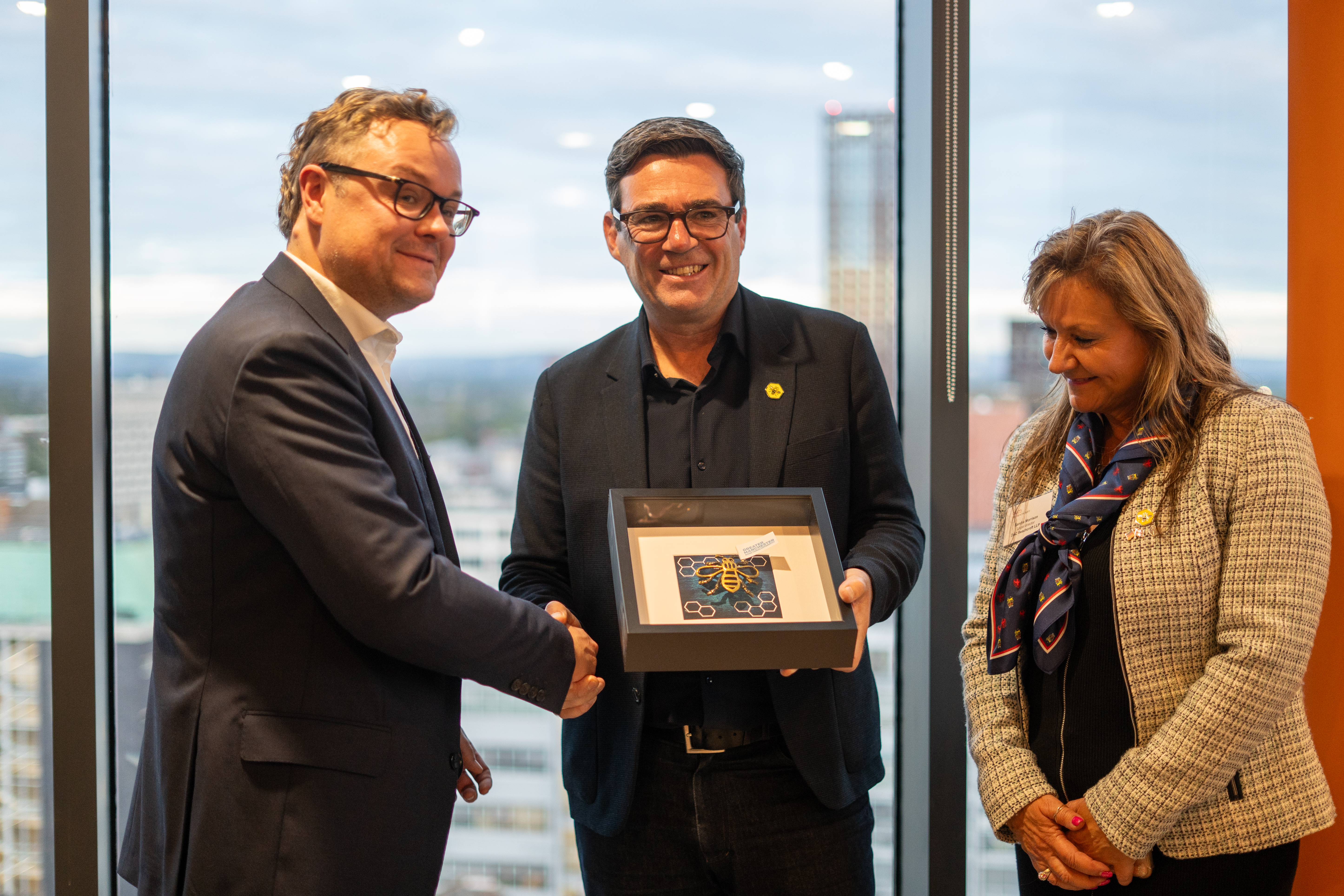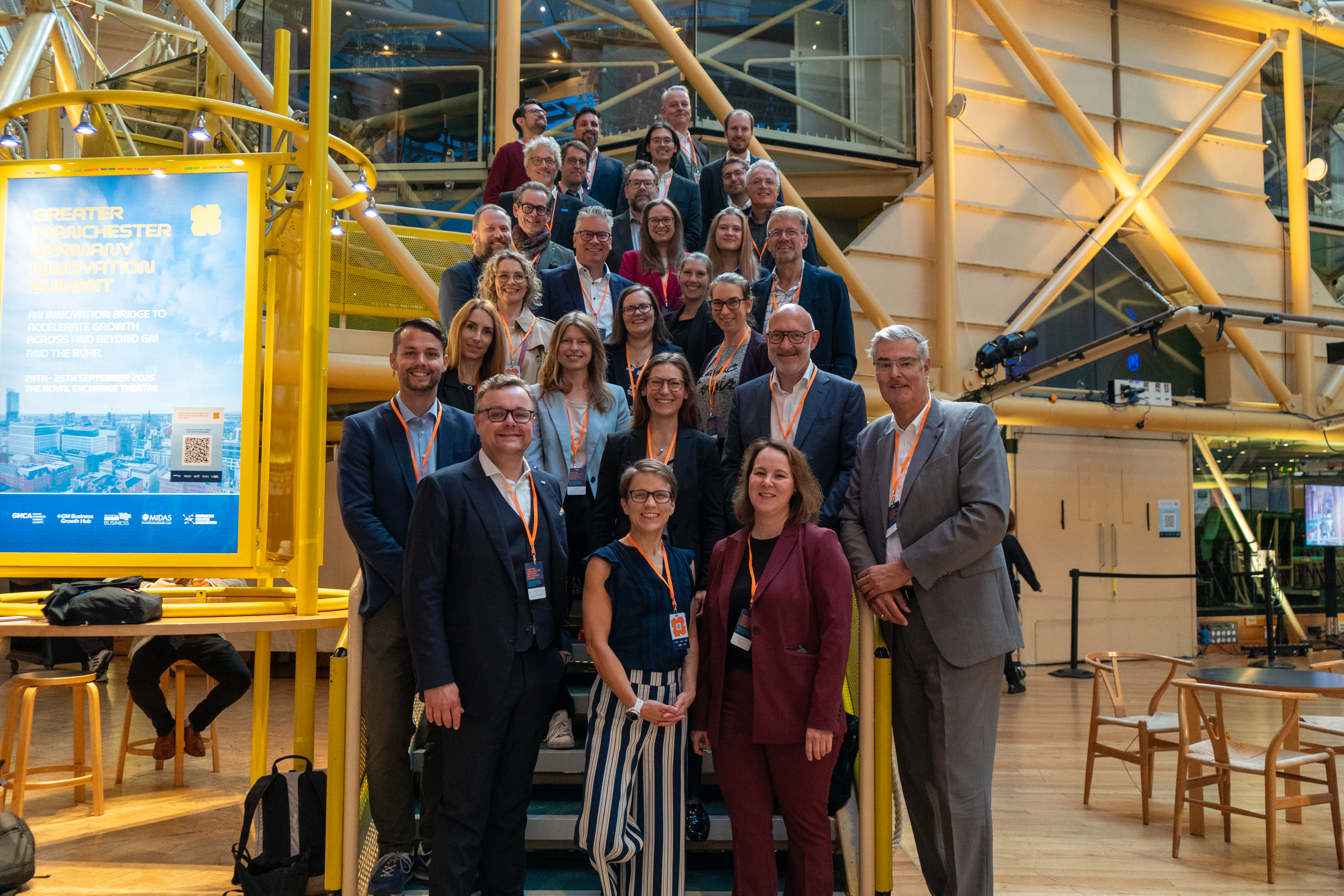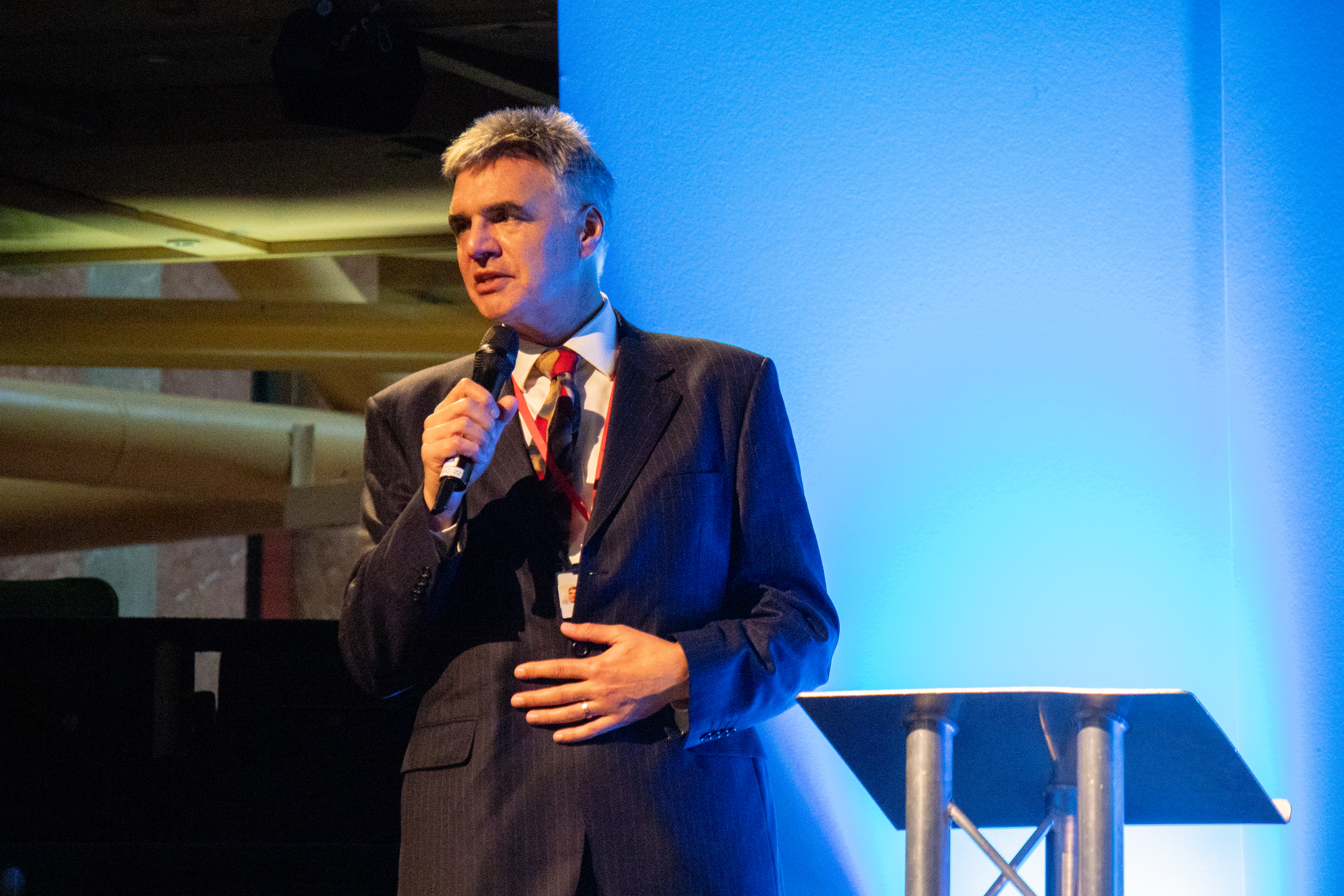On 24–25 September, Greater Manchester and the Ruhr region came together at the Royal Exchange Theatre for the first Innovation Summit. This two-day event—supported by the Greater Manchester Combined Authority, GM Business Growth Hub and Innovation Greater Manchester—marked the first major milestone of the Innovation Bridge, signed in May 2025.
Fifty German delegates joined representatives from leading businesses and universities across Greater Manchester to explore how to make innovation real: driving investment, building partnerships, and shaping the future of hydrogen, digital health and cyber security.
“Having been to the Ruhr region earlier in the year, it was a pleasure to welcome them here to develop our partnership. The work being done across our two innovation ecosystems is really exciting.
“The event last week has solidified how much of a shared mission this is. Both here in Greater Manchester and over in the Ruhr region, we’re doing all that we can to create forward-thinking environments where innovation is a real, tangible thing. I’d like to thank everyone that took part and attended.” Janine Smith, Director of GM Business Growth Hub.
Innovation with Intent
The Summit showed that innovation needs a clear purpose to deliver solutions. It also requires healthy competition and integrated approaches. This means working across borders and sectors, taking calculated risks, building trust and ensuring the benefits reach everyone. Challenges and opportunities explored across both days included regulation, costs, infrastructure, cultural attitudes, as well as the need for stronger skills pipelines.
Hydrogen: Time to Act
Day one opened with remarks from GM Mayor Andy Burnham and Sandra Morrison, Honorary Consul of the Federal republic of Germany in Manchester. Chaired by Amer Gaffar (Manchester Metropolitan University) and Illona Alcock (co-founder of Elevate consultancy), the day focused on the production of green hydrogen.

![]()
Chairing the Innovation Summit was a proud moment, especially as we launched Greater Manchester’s updated hydrogen strategy. Working with partners across both regions on our shared journey to a cleaner, greener future is truly energising.
Tangible outcomes happen when we support small, scalable projects. Let’s not wait around for large, complex initiatives to take shape.
Amer Gaffar, Director of Industrial Strategy Partnerships
Highlights included:
-
The launch of the revised GM Hydrogen Strategy by GMCA’s Mark Atherton, which is now open for consultation until November.
-
Workshops on research and innovation, skills and supply chains, and production and distribution.
-
Site visits to the Fuel Cell Innovation Centre, Graphene Engineering Innovation Centre and Hydrogen Safe.

-
Plans for HYTECH – a new hydrogen testing facility (modelled on Duisburg’s ZBT), which will accelerate market expansion by giving businesses and academic researchers equal access to cutting-edge technology in the city region.
-
Chris Manka of the GM Business Growth Hub announced that Bosch is offering UK businesses the chance to co-develop demonstrator systems in the GM Hydrogen Supply Chain Innovation Challenge (applications close on 23 October).
The message was clear: the time to act is now. Unlocking hydrogen’s potential requires investment in transport, harbours, electrolysers, pipelines and public demand. That means cutting through planning barriers and funding regulations to reduce costs and offer alternative financing models. Panellists also called for fewer decision-making bottlenecks, campaigns to shift public attitudes, closer international collaboration and integrated renewable networks.
Digital Health & Cyber Security: From Risk to Resilience
Day two was opened by Andrew Hodgson OBE (Innovation Greater Manchester) and was chaired by Professor Mandy Parkinson (University of Salford).
Keynotes from Laura Rooney (Health Innovation Manchester) and Professor Sebastian Merkel (Ruhr University Bochum) showed how AI can be adopted safely to transform healthcare. Examples included prescribed digital apps for mental health, precision diagnostics and pre-operative planning through 3D mapping.
Both speakers warned of the barriers in this sector: long time-to-market, strict regulation, evidentiary data requirements, and proof of cost-effectiveness. As Laura Rooney put it: “delay in this area is not neutral – it costs lives.”
Interrelated discussions on cyber security highlighted the importance of public attitudes in this burgeoning field. It is difficult to promote a sector where success means progress as normal. Panellists argued that recent high-profile attacks should be used to highlight the everyday realities of digital innovation. From supply chains to printers, air systems and even building access, cyber affects businesses of all sizes. Experts recommended organisations (including SMEs) dedicate around 20% of budgets to cyber planning and training.

![]()
As Innovation Greater Manchester enters a new era, ramping up investment to create a new engine of growth in the heart of the North, this Summit was a key moment. Collaboration, across Greater Manchester and internationally, is driving real change, that will see more high-quality jobs and comprehensive support for new and developing businesses.
What we do here is an example that can be replicated across the UK, and even further afield thanks to our partners in the Ruhr region, as well as acting as a blueprint for our initiatives with other international partners.
David Levene, Director, Innovation Greater Manchester (IGM)
Four Big Lessons
Across both days, shared priorities emerged:
-
Building trust and shifting historical attitudes matter as much as infrastructure.
-
SMEs and start-ups need structured support to grow and build resilience.
-
Skills training must start early in schools.
-
Equity must sit at the heart of innovation.
“The breadth of knowledge and expertise over the two-day summit showed just how much potential we hold in our city region. I truly believe that Greater Manchester is the best place in the UK to be right now.
“We’re already working behind the scenes with our partners to share more opportunities for people to get involved and innovate, whether that’s here in Greater Manchester the Ruhr region or even further afield. It’s really exciting to be part of what’s to come.” Yvonne Grady, Head of Innovation, GM Business Growth Hub.

Get Involved
The Innovation Summit showed how collaboration between Greater Manchester and the Ruhr region can turn ambition into action. Now is the time to get involved. Here’s how:
-
Register your interest and become part of a growing community that’s shaping the region’s next generation innovations.
-
Respond to GMCA’s Hydrogen Policy consultation (open until November).
-
Explore the Bosch Hydrogen Supply Chain Challenge (deadline 23 October).
-
Stay connected with upcoming Innovation Bridge events and programmes.
Get in touch
Please contact us at 0161 3593050 or query below.
Take that first step and we’ll support you with whatever you need to succeed.
Sign-up to our newsletter
Insights, news, events and opportunities straight to your inbox.